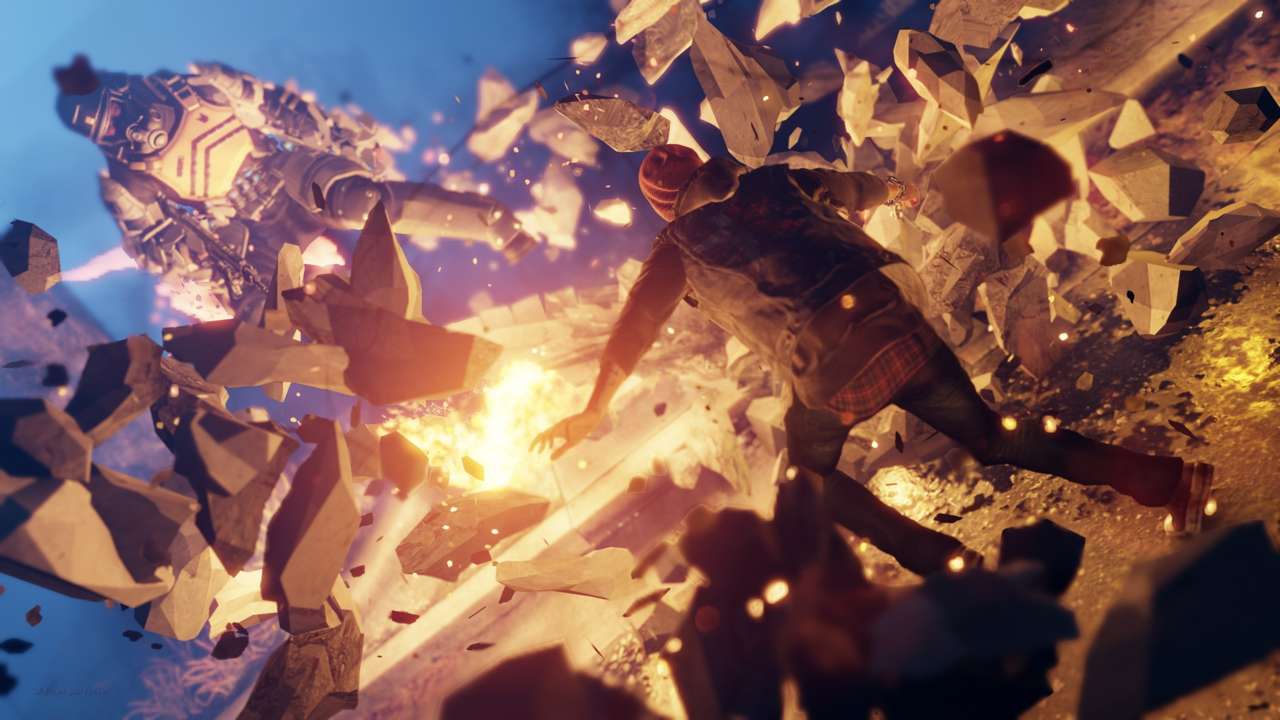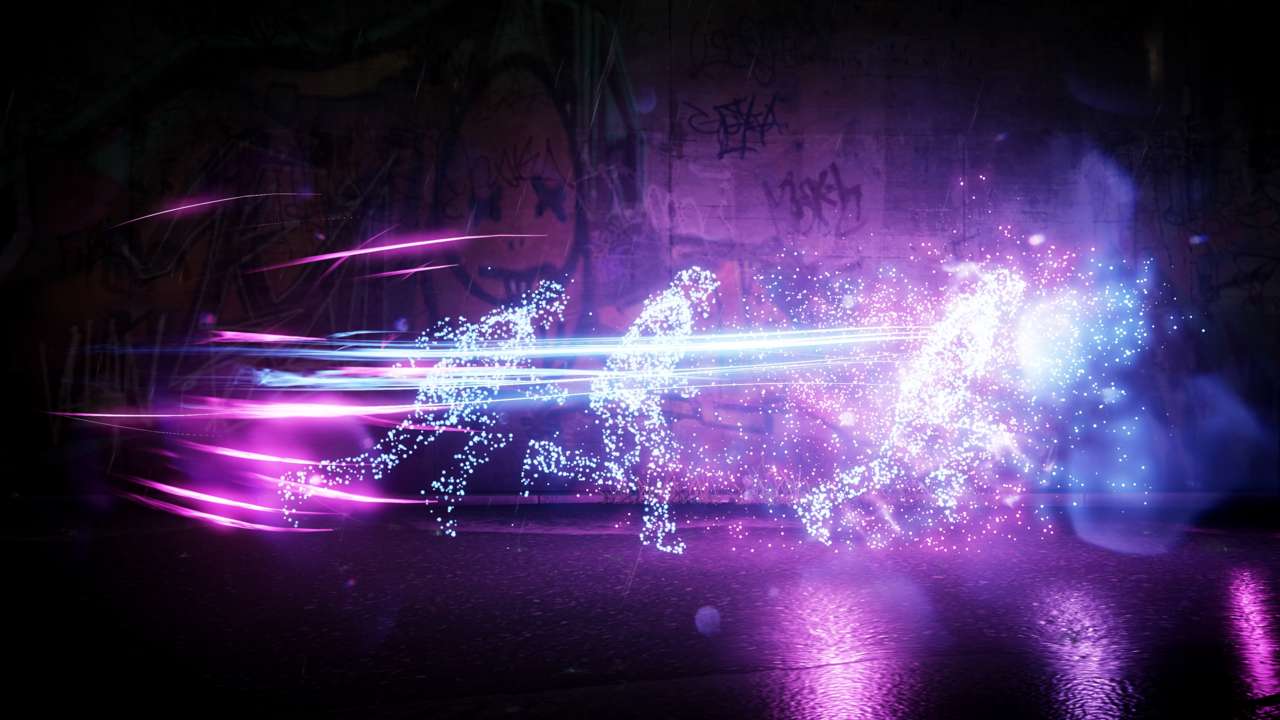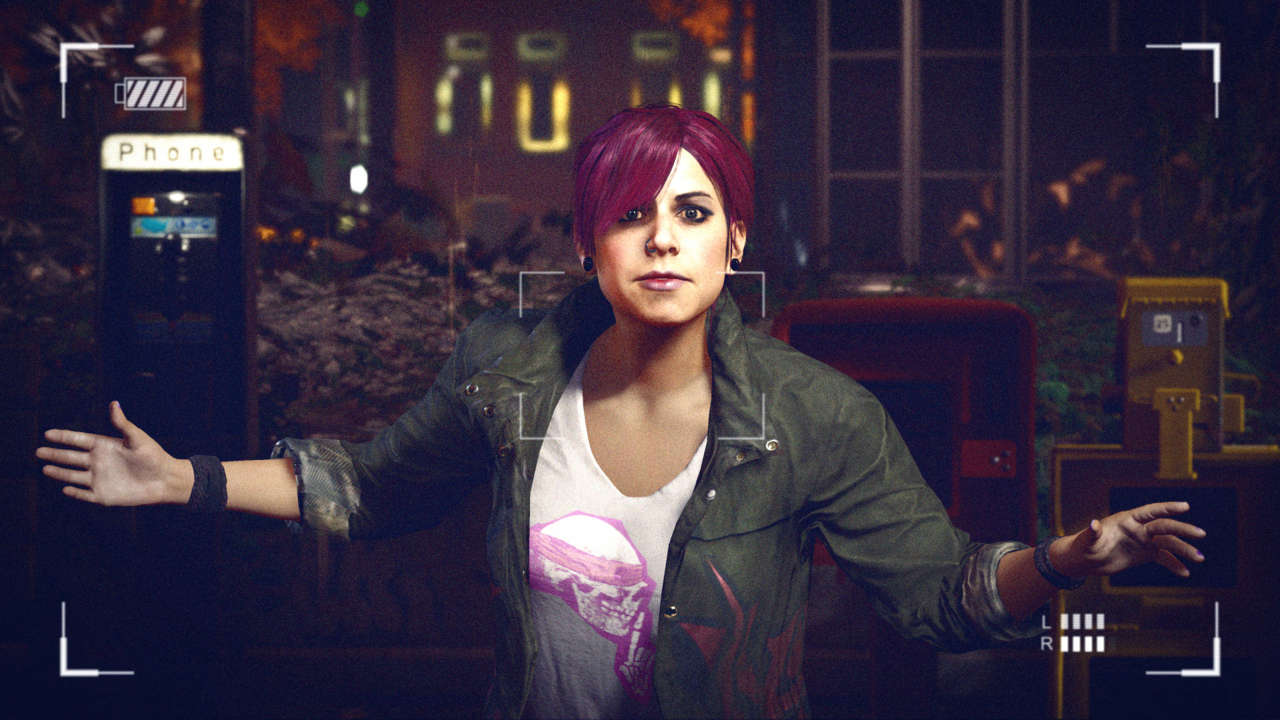Cole MacGrath has an important decision to make. A group of hungry refugees are about to swarm an abandoned shipment of food like ants on a crumb. Cole could easily swat them away by zapping one or two pedestrians and then steal the food for himself. Alternatively, he could do nothing, let the masses have their fill, and go find other means of satisfying his empty stomach. It's a simple choice of good versus evil, selfishness versus selflessness. But it's also a choice, as Infamous developer Sucker Punch discovered, that will most likely determine humanity's fate.
Moral choices--specifically black-and-white moral choices--are a hallmark of the Infamous series. For two games you have been guiding series protagonist Cole MacGrath down a path of good or evil. In Infamous 2, those ideologies were given a voice with Nix and Kuo, two women who acted as the proverbial angel and devil riding on Cole's shoulders. Now, with Infamous: Second Son, Sucker Punch is looking to put a more dramatic spin on how it handles new series protagonist Delsin's morality. It's no longer enough to simply say whether you want to be good or evil. In Infamous: Second Son, you must prove it.
Fallout 4 Next Gen Update Comparison Stellar Blade - Hard Mode No Damage Gigas Boss Gameplay Stellar Blade - Hard Mode No Damage Abaddon Boss Gameplay Stellar Blade - (Almost) All Outfits Granblue Fantasy: Relink - New Content Trailer Modern Warfare III - New Season 3 Reloaded Modern Warfare Zombies Update River City Girls 2 - New Playable Characters DLC Reveal!! That Time I Got Reincarnated as a Slime ISEKAI Chronicles – Official Announcement Trailer MEGATON MUSASHI W: WIRED – Official OP “MUSASHI English Ver.” Trailer Gothic 1 Remake | Official Collector's Edition Trailer SaGa Emerald Beyond – Official Launch Trailer Paper Mario: The Thousand-Year Door – Official Switch Overview Trailer
Please enter your date of birth to view this video
By clicking 'enter', you agree to GameSpot's
Terms of Use and Privacy Policy
CHOICE MATTERS
Having a morality system in the first place is a tricky task for Sucker Punch. Video games already present enough problems for storytellers without the added difficulty of letting you fork the story in extreme ways. At the end of the day, it would be much simpler to have you play the typical hero and force you down a path of justice and do-gooding. So why go through all the trouble? According to co-founder Chris Zimmerman, choice is what got people excited about Infamous in the first place.
To make you feel as if you had done something truly heroic--or villainous--the option had to exist for the inverse.
"When we started developing Infamous," explained Zimmerman, "the thing that worked for people was when we said, 'You get to decide if you're a good guy or a bad guy.' We would tell them that in the middle of telling them 10 other things about the game, and they would stop us and say, 'That's what I want from the game. I want that choice.' Learning that caused us to take a step back and think about our [karma system] a bit more, and once we came to that realization that we wanted to base the game around whether you were a good guy or a bad guy, a lot of things started popping into place. The karma system is really one of the core things that helped the game coalesce."
Giving players the choice whether to play as a hero or a villain also helped reinforce the game's superhero fantasy. Classic superhero stories revolve around a clear-cut struggle of good versus evil. To make you feel as if you had done something truly heroic--or villainous--the option had to exist for the inverse. "I believe being a hero requires you to give of yourself," said Nate Fox, director of Second Son. "If [being a hero] were trivial and easy, it would just feel like everyday life. It's the sacrifice that marks someone as spectacular, so if you're trying to make a game that's honest-to-god saying, 'Okay, an everyday guy just got superpowers. What would he do with them?' you have to put in the option for chaos."

ALL OR NOTHING
Since the release of the first Infamous game roughly five years ago, Sucker Punch has been studying how players play Cole to help improve their karma system. "Every time we make a new Infamous game, we look at the karma system and ask ourselves, 'How can we improve the experience for people?'" said Zimmerman. "From Infamous to Infamous 2, we wanted to personify the karma system by introducing Nix and Kuo, which embody the ruthless and goody-two-shoes approaches. This way, when you're making a karma choice, it's not just some abstract moral decision, but you're also choosing which character you want to associate with."
"After Infamous 2, we looked back on all the data we had collected on how people were playing the games, and the data was really clear that people, basically, decide before they even buy the game that they're going to play good or evil," added lead designer Jaime Griesemer. "They sit down and make the first choice be good, then the second to be good, and so on. Sometimes we'd see, like at the end of Infamous 2, some people were playing evil but hit their moral limit and switched to good at the last second--and that's great. If we can make you rethink how you're going to play based on the story, that's fantastic, but because we gave you the best powers based on if you committed to one path or the other, people tended to do just that."
"We looked into ways of offering ambiguity--of having morally gray decisions--but because we're sort of a comic book game, people don't want to play a meandering, middle-of-the-road kind of hero (or villain)," continued Griesemer. "Once you decided you were going to be good or evil, you didn't really have to think about it or even look at the options any more. We've since realized we're never going to get someone to evaluate every single moral choice based on context and story if there are powers involved, because people will gravitate to what gives them the best powers."

MIGHT MAKES RIGHT
Since moral ambiguity is off the table, the team at Sucker Punch has been hard at work experimenting with other ways to improve their karma system. The good-or-evil choices from previous Infamous games aren't going anywhere, but in Second Son, if you want to be the best at either, you're going to have to earn the title. This means constantly going out of your way to either protect the populace or ruin them. After all, a "hero" who accidentally blows up your car and barbecues a few of your neighbors isn't much of a hero.
Zimmerman does a great job expanding on all this in our recent Now Playing of Infamous: Second Son, but in brief, you always want to be working toward either a good or an evil karma streak. You earn good karma by carefully aiming your shots so that you don't kill--only subdue--your enemies. Alternatively, you accrue evil karma by causing wanton destruction as quickly, and violently, as possible. If you do either of these long enough, you'll build up enough karma to unleash a special attack that will either incapacitate or obliterate all enemies onscreen.
After all, a "hero" who accidentally blows up your car and barbecues a few of your neighbors isn't much of a hero.
Both styles feel very different; one requires precision and the other is all about reckless abandon. When you're building up good karma, it stays locked and loaded and won't disappear unless you accidentally kill a civilian or something along those lines. Evil karma, on the other hand, is on a time limit. Think of it like building a combo in other action games: if you don't keep the destruction going, you will lose the evil karma you've built up. There are also ways to defeat your foes in a karmatically neutral fashion, but doing so won't earn you any progress toward those special attacks.
Outside of combat, Sucker Punch is also pushing the emotional impact of your choices. In the first two Infamous games, you were responsible only for Cole's actions. But in Second Son, your choices will not only drive Delsin down a path of good or evil, but will directly shape the personalities of those around him as well. "We have characters Delsin meets along the way, and through the choices you make, you change them--either redeeming or corrupting them--and their personal arcs are altered forever," said Fox. "Now it's not just Delsin changing along the way, but these other people as well." You may be OK with turning Delsin into a supervillain, but will you also be OK with the knowledge that you've directly twisted the mind of another as well?

These changes to Infamous' karma system mean it's no longer enough to talk the talk of a hero; you must also walk the walk. Sucker Punch has always used the struggle between good and evil as the foundation for the Infamous series, and now it takes center stage in Second Son, both in combat and in narrative. As Zimmerman explained, "There are people who really get into the game's morality systems, and are really role-playing through the game. Those people want the struggle to matter. They want it to be hard to be a good guy or a bad guy, and then feel like that hard work was rewarded. If we take away that challenge or difficulty, it makes the journey feel less meaningful--and I find that fascinating."